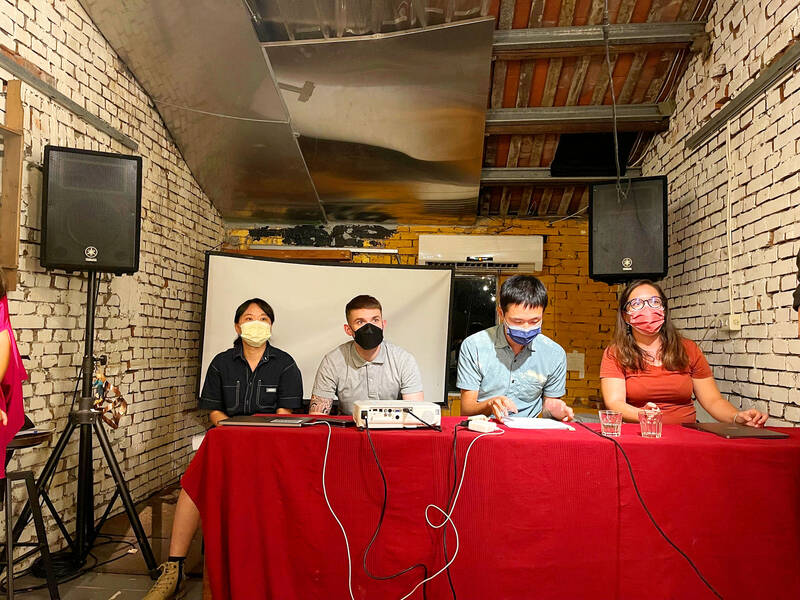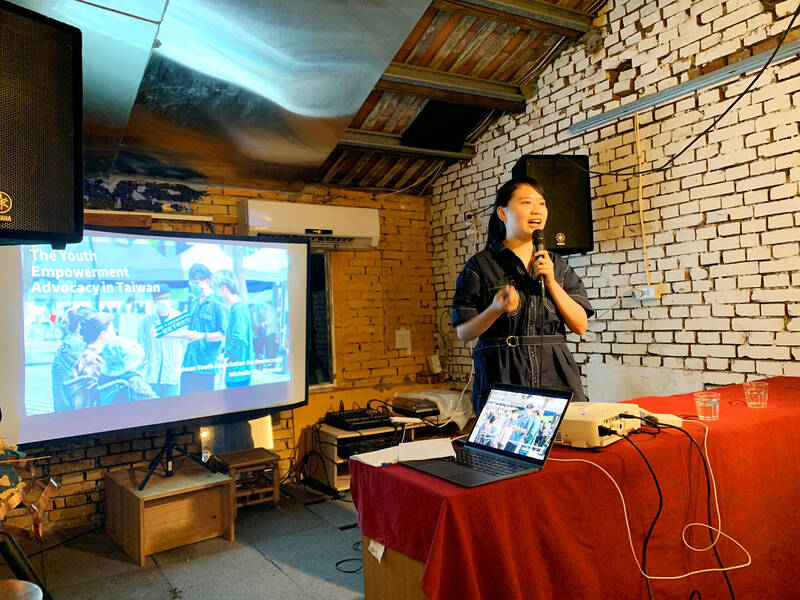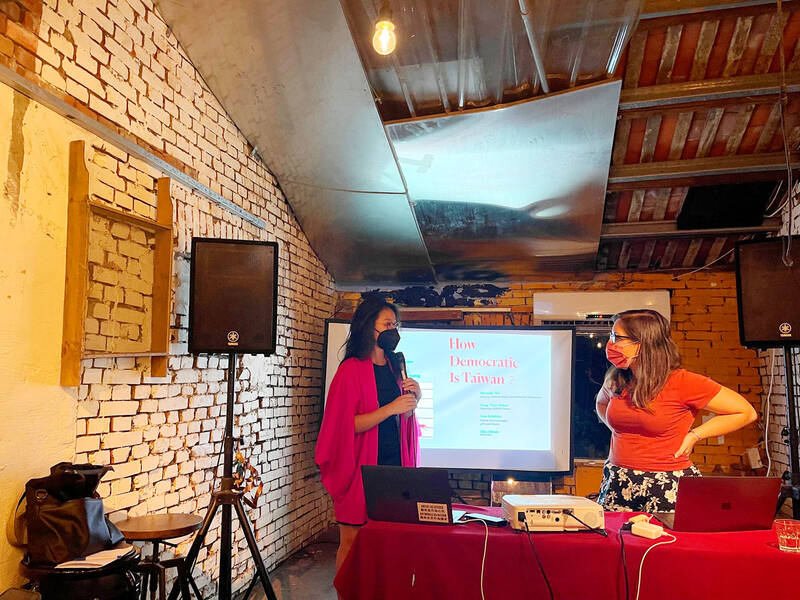Taiwan ranked eighth in the Economist Intelligence Unit’s (EIU) Democracy Index 2021, behind only New Zealand, Ireland and the Nordic countries.
Titled The China Challenge, the report and its accompanying essay touched on notions of a global “democratic recession” and the hope of “democratic renewal” in light of regression to more authoritarian modes of governance in many parts of the world.
No country should be more concerned by China’s attempts to export its “alternative model” — dubiously referred to as “political meritocracy” — than Taiwan; and while the EIU rankings paint an encouraging picture, Taiwan cannot rest on its laurels.

Photo: James Baron
Hosting its first event at Tacheles (廢墟) in Taipei’s Wanhua District (萬華) on Sept. 29, Klartext Salon (坦白沙龍), posed the question How Democratic is Taiwan?
“Eight out 10,” was Sam Robbins’ (羅翔鈞) assessment.
Robbins, an editor at Taiwan Insight and participant in g0v — an open government collaborative — stressed that this was impressive, given Taiwan’s diplomatic and economic marginalization.

Photo: James Baron
“A full 10 out of 10 is always going to be incompatible with global capitalism because some decisions are always going to be out of Taiwan’s hands,” he said.
So where can Taiwan improve?
In assessing Taiwan’s achievements, Robbins asked a further question: “What do we want from democracy as people living in a democracy?”

Photo: James Baron
Noting that there are many forms of democracy, including direct, deliberative and representative, Robbins also drew attention to interest among tech activists in ideas such as liquid democracy, where online voting tokens might be delegated to others.
For his definition, Robbins goes with a version of democracy that fits his background in open government. The key components are participation, transparency and accountability. Concerning the first aspect, Robbins observes that, “democracy doesn’t only happen every four years,” and that “building participation means creating channels that can take place all the time.”
However, more channels doesn’t always equate to greater democracy. Referring to a podcast on which he worked as a researcher, where a speaker raised the concept of “democratizing democracy,” Robbins observed that this can put an excessive burden on voters to be “constantly informed on every issue and … make decisions all the time.”
Those familiar with the mandatory referenda of the Swiss voting system would probably agree that voter apathy is a concomitant of such arrangements.
“Sometimes I just want a nap,” Robbins quips. “I don’t want to be voting all the time.”
MEANINGFUL PARTICiPATION
In terms of tech, Robbins stresses that a proliferation of online platforms is also no guarantee of greater participation. He cites the I-Voting system set up by Taipei Mayor Ko Wen-je (柯文哲) in 2015 as “dead in the water.” The real issue, Robbins says, is “building something that is genuinely useful and connects to people in a meaningful way.”
Robbins believes that g0v has achieved this by connecting to communities who might not normally engage with tech.
Deliberative democracy — where stakeholders discuss issues and feedback is used to form policy — is another area where Taiwan has done well, with the Democratic Progressive Party (DPP) deserving credit for incubating this in the early 2000s. The problem here is that most of these efforts are “a top-down process,” and focused on community issues rather broader problems such as poverty.
As for transparency, Robbins says that, from a data perspective, “there’s no law regarding what should be released but just a directive to release data — so it’s very piecemeal.”
The establishment of the Ministry of Digital Affairs (MODA) in August, headed by Audrey Tang (唐鳳), has raised further questions. In his previous role at Open Culture Foundation (開放文化基金會), Robbins says he was involved in monitoring the development of MODA but that “the process was so opaque.” It was only a month before it began operations that anyone had a clue what its remit would be, he says.
TOXIC MEDIA ENVIRONMENT
Addressing accountability, Robbins highlighted “legal and procedural vagueness in Taiwan,” making it unclear who does what. Based on potential overlap with the National Communications Council (NCC), MODA was again cited. Quoting Tang’s comment that MODA was “the acceleration pedal,” and the NCC “the brake,” Robbins says this “isn’t policy — it’s just a metaphor.”
As a foreign journalist in Taiwan, Alice Herait focused on domestic media. She echoed the conclusion in Reporters Without Borders’ 2022 press freedom index that political polarization and a preoccupation with sensationalism have polluted Taiwan’s media environment.
Creating an atmosphere where a plurality of voices can be heard is also crucial, says Herait. It was with this in mind that she established Klartext with political scientist Liya Yu (喻俐雅), the moderator for the event.
Herait compares the situation with the ultra-right National Rally party in her native France.
“We might not like these views but trying to repress them is not healthy,” she says. “In Taiwan, there’s the same issue. If some people support unification with China, their arguments should be given exposure and real debate.”
Echoing Robbins’ points on data transparency, Herait also comments on difficulties in arranging interviews — something that will be familiar to many journalists in Taiwan.
“Every time I ask for an interview with an institution, they ask me to first detail all my questions and won’t respond to anything that wasn’t in the e-mail.”
VOTING BARRIERS
Contributions from historian, Peng Chao-hsuan (彭照軒) and Michelle Wu (吳奕柔), director of Taiwan Youth Association for Democracy (TYAD, 灣青年民主協會), rounded out proceedings.
Taking the audience through the intellectual heritage of Taiwan’s democracy, Peng stressed that it should not be “reduced to abstract definitions or nationalist identity.” Instead, the diverse influences and movements that sparked democratization can “help us explore what is at stake in today’s context.”
In her role as TYAD head, Wu referred to policies outlined in a white paper published by the organization in January. These include issues of intergenerational justice, energy transition and sustainability, and diverse values.
The referendum on a constitutional amendment to lower the voting age from 20 to 18, to be held alongside local elections on Nov. 26, is also a key focus. With the endorsement from 50 percent eligible voters required to pass the amendment, the TYAD work on boosting support among the elderly demographic.
Even those young people of voting age face obstacles, such as the legal requirement that they vote in their hometowns. With students often reticent to incur travel costs, the TYAD assists with shuttle buses and discounted tickets.
“Every election, we send about 3,000 people back to vote,” Wu says. “But it’s not only about that. The project is to make people aware that you need to go because you have the chance to affect the result.”
Followed by a lively Q&A session, the event certainly fulfilled Klartext’s aim of “promoting a better understanding of Taiwanese politics and society for an English-speaking audience.”
In particular, Yu says, “We want to move away from single ideological discourse of Taiwan identity, address polarization and bring together disparate views.”
Future panels will spotlight women’s rights, with contributions from the Awakening Foundation (婦女新知基金會) and nurse unionists, support for the death penalty and the Chinese Nationalist Party’s (KMT, 國民黨) potential role in an independent Taiwan. For more information about future talks, search for Klartext Salon on Facebook.

In the March 9 edition of the Taipei Times a piece by Ninon Godefroy ran with the headine “The quiet, gentle rhythm of Taiwan.” It started with the line “Taiwan is a small, humble place. There is no Eiffel Tower, no pyramids — no singular attraction that draws the world’s attention.” I laughed out loud at that. This was out of no disrespect for the author or the piece, which made some interesting analogies and good points about how both Din Tai Fung’s and Taiwan Semiconductor Manufacturing Co’s (TSMC, 台積電) meticulous attention to detail and quality are not quite up to

April 21 to April 27 Hsieh Er’s (謝娥) political fortunes were rising fast after she got out of jail and joined the Chinese Nationalist Party (KMT) in December 1945. Not only did she hold key positions in various committees, she was elected the only woman on the Taipei City Council and headed to Nanjing in 1946 as the sole Taiwanese female representative to the National Constituent Assembly. With the support of first lady Soong May-ling (宋美齡), she started the Taipei Women’s Association and Taiwan Provincial Women’s Association, where she

Chinese Nationalist Party (KMT) Chairman Eric Chu (朱立倫) hatched a bold plan to charge forward and seize the initiative when he held a protest in front of the Taipei City Prosecutors’ Office. Though risky, because illegal, its success would help tackle at least six problems facing both himself and the KMT. What he did not see coming was Taipei Mayor Chiang Wan-an (將萬安) tripping him up out of the gate. In spite of Chu being the most consequential and successful KMT chairman since the early 2010s — arguably saving the party from financial ruin and restoring its electoral viability —

It is one of the more remarkable facts of Taiwan history that it was never occupied or claimed by any of the numerous kingdoms of southern China — Han or otherwise — that lay just across the water from it. None of their brilliant ministers ever discovered that Taiwan was a “core interest” of the state whose annexation was “inevitable.” As Paul Kua notes in an excellent monograph laying out how the Portuguese gave Taiwan the name “Formosa,” the first Europeans to express an interest in occupying Taiwan were the Spanish. Tonio Andrade in his seminal work, How Taiwan Became Chinese,